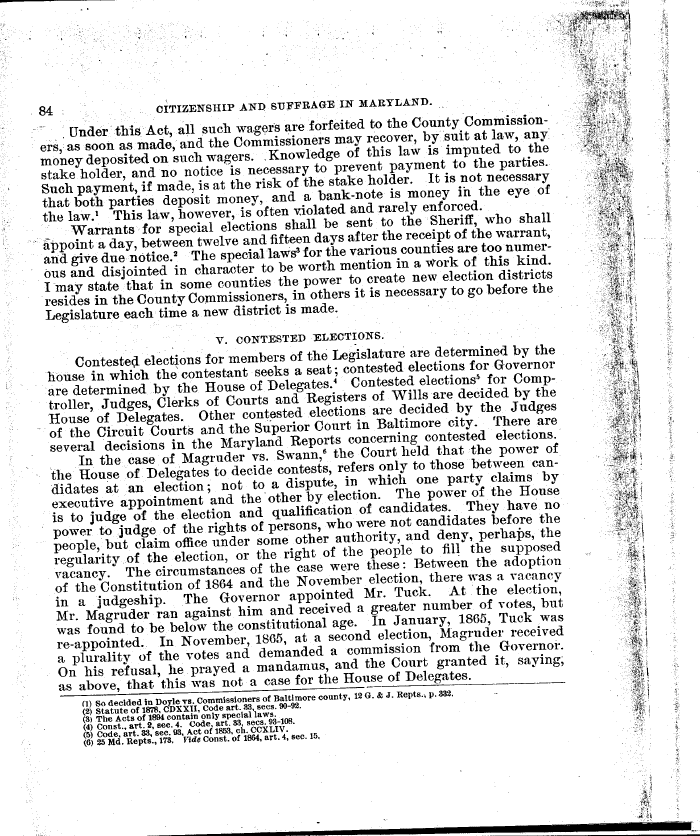|
$4
CITIZENSHIP AND SUFFRAGE IN MARYLAND.
Under this, Act, all such wager's are forfeited to the County Commission-
ers,~ as soon as made, and the Commissioners may recover, by suit at law,
any
money deposited on such wagers. . Knowledge of this law is imputed to the
stake holder, and no notice is necessary to prevent payment to the parties.
Such payment, if made, is at the risk of the stake holder. It is not
necessary
that both parties deposit money, and a bank-note is money iii the eye of
the law.' This law, however, is often violated and rarely enforced.
Warrants for special elections shall be sent to the Sheriff, who shall
appoint a day, between twelve and fifteen days after the receipt of the
warrant,
and give due notice.2 The special laws' for the various counties are too
numer-
ous and disjointed in character to be worth mention in a work of this kind.
I may state that in some counties the power to create new election districts
resides in the County Commissioners, in others it is necessary to go before
the
Legislature each time a new district is made.
v. CONTESTED ELECTIONS.
Contested elections for members of the Legislature are determined by the
house in which the contestant seeks a seat ; contested elections for
Governor
are determined by the House of Delegates.' Contested elections' for Comp-
troller, Judges, Clerks of Courts and Registers of Wills are decided by the
House of Delegates. Other contested elections are decided by the Judges
of the Circuit Courts and the Superior Court in Baltimore city. There are,
several decisions in the Maryland Reports concerning contested elections.
In the case of Magruder vs. Swann," the Court held that the power of
the House of Delegates to decide contests, refers only to those between can-
didates at an election; not to a dispute, in which one party claims by
executive appointment and the other by election. The power of the House
is to judge of the election and qualification of candidates. They have no
power to judge of the rights of persons, who were not candidates before the
people, but claim office under some other authority, and deny, perhaps, the
regularity. of the election, or the right of the people to fill the supposed
vacancy. The circumstances of the case were these: Between the adoption
of the Constitution of 1864 and the November election, there was a vacancy
in a judgeship. The Governor appointed Mr. Tuck. At - the election,
Mr. Magruder ran against him and received a greater number of votes, but
was found to be below the constitutional age. In January, 1865, Tuck was
re-appointed. In November, 1865, at a second election, Magruder received
a plurality of the votes and demanded a commission from the Governor.
On his refusal, he prayed a mandamus, and the Court granted it, saying;
as above, that this was not a case for the House of Delegates.
ll) So decided in Doyle vs. Commissioners of Baltimore county, 12 G. & J.
Repts., p. 332.
(2) Statute of 1878. CDR%lI, Code art. 33, sees. 90-92.
(3) The Acts of 1894 contain only special laws.
(4) Const., art. 2, sec. 4. Code, art. 3.3, sees. 93-108.
(5) Code' art. 33, sec. 93, Act of 1853, ch. CC%LIV.
(0) 25 M. Repts., 178.Vide Const. of 1864, art. 4, sec. 15.
|

